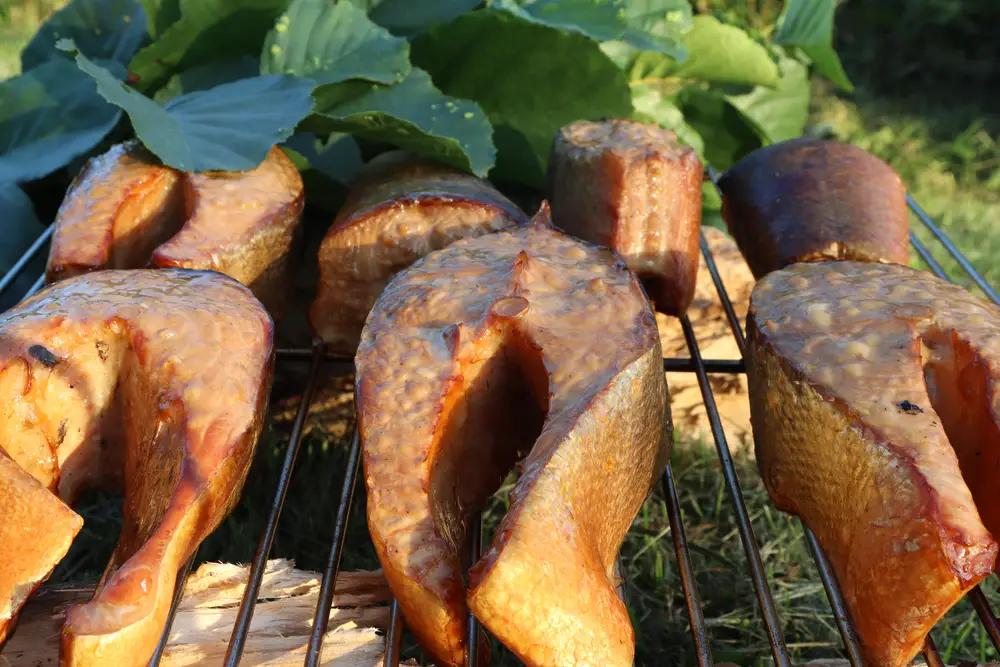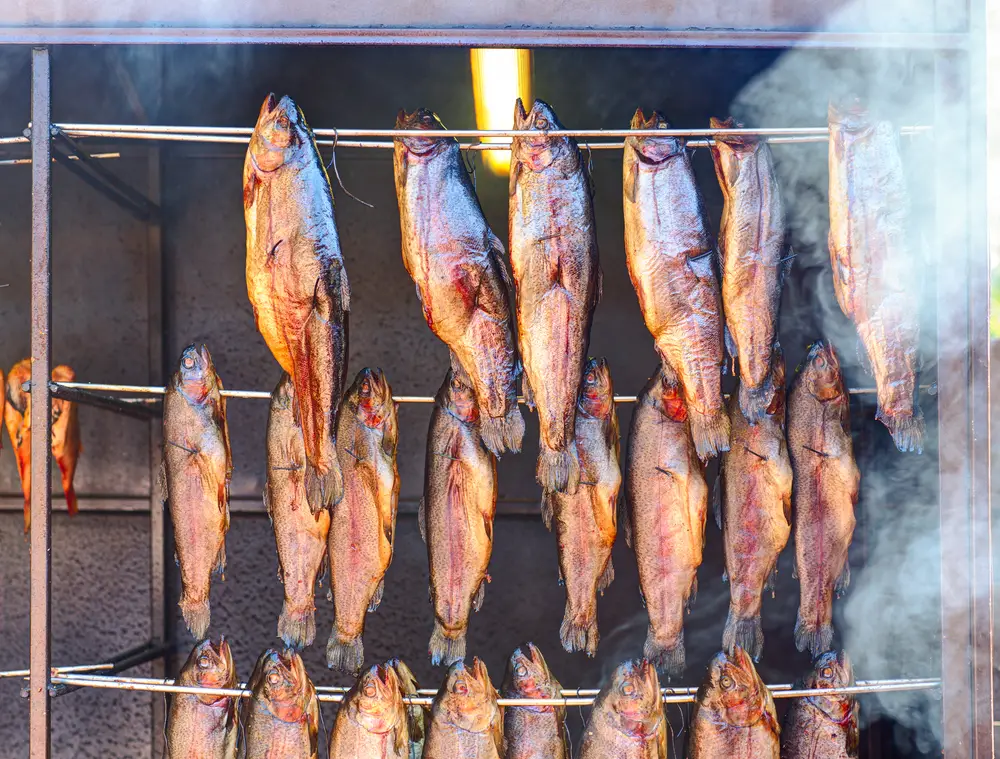
Smoking meat is a popular form of adding a unique flavor to the food. Meats usually go alongside a particular smoke flavor, such as apple wood for pork.
Salmon is great for smoking, but you want to know what flavor goes best with the fish to not overpower it. Salmon has a naturally gentle flavor that isn’t overly fishy, so you don’t want to ruin it with a strong smokey flavor.
Alder is possibly the best smoke flavor for salmon as it is the most gentle of most smoke flavors. Not only will it bring out the flavors of salmon, but it will also give it a slightly smoky taste that cannot be replicated on a regular grill or frying pan.
This is best for cold smoking salmon, which lasts at least a day, as you won’t have to worry about overpowering the salmon or turning it sour.
Maple is another good smoke flavor for salmon as it produces a slightly sweet and mild flavor that, like alder, doesn’t overpower the salmon. This is a hardwood that is usually used with poultry and vegetables due to its gentle flavor, which is why it’s also popular for salmon.
If you fancy something slightly earthier, you should try hickory. Hickory is typically used for grilling pork and bacon, which are both complemented with smoky and sweet flavors as with salmon.
The only problem with hickory is that you have to be careful not to overpower the salmon, as leaving the fish exposed to the timber could leave the salmon inedible.
Note: most links in this article are Amazon.com Affiliate links, see Affiliate Disclosure, thank you.
Do I have to brine salmon before smoking?
You don’t necessarily have to brine salmon before smoking, but brining does come with a lot of tasty benefits. In theory, you can just chuck the salmon in the smoker and let it do its thing, but brine will enhance the flavor.
Smoking salmon without a brine will cook the salmon, but it will be dry and potentially stringy. As smokers are designed to enhance the flavors and textures of food, you should probably look to brine your fish to make the most of it.
If you choose to not brine your salmon for whatever reason, try to smoke it at a high temperature before cooking it, as this might help it to retain its moisture.
For the best salmon results, you should brine your fish. The brine mixture is usually a cup of kosher or sea salt, half a cup of water, and two cups of brown sugar.
This mixture is balanced with sweet and salty to complement the gentle natural flavors of the fish, plus the salt works to get rid of the white stuff as the fish cooks.
Not only will brine help to enhance the flavors of both the salmon and the smoke, but it will also provide extra moisture to the fish, which will make it much easier (and nicer) to eat.
Salmon should fall apart in smooth chunks and shouldn’t be too hard to chew, which can happen if the salmon isn’t brined.
Will smoking fish ruin my smoker?
Despite what everyone says, smoking fish won’t ruin your smoker. If you’re smoking your meats and vegetables properly and taking care of your smoker when it’s not in use, then smoking fish in it won’t affect it badly at all.

If you find that your smoker has been smelling recently and you reckon it might be the fish, here are our steps to consider before blaming fish as the problem.
- Properly prepare the smoker:
As with any food you smoke, smoking fish (especially salmon) will lose moisture and fat. To prevent the lingering smell of fish fat, keep the fish on a pan or wrap the grates with aluminum foil.
You should also put a pan or aluminum foil underneath the fish as an extra layer of protection against moisture and fat drips. If you don’t properly prepare your smoker, then smoking fish can make cleaning your smoker an absolute nightmare.
- Smoke the fish properly:
There are two ways of smoking fish: cold and hot smoking. Cold smoking is when fish are smoked at 60°F, whereas hot smoking is at 200°F. You should brine your fish before either method, but you must brine to a complete cure if you cold smoke.
Cold smoking takes the longest (usually around a day) and works brilliantly in proper smokers. Still, bacteria can form in this low temperature and long cooking time, so curing is essential.
Hot smoking fish will only take an hour or two and minimizes the growth of unwanted bacteria. With both methods, make sure to prepare the smoker.
- Clean the smoker:
A smoker isn’t like a skillet that needs additional seasoning and no cleaning. You must read your manual to see what parts of the smoker can and cannot be cleaned.
As with any cooking appliance, you should clean your smoker regularly to prevent bacteria and rust build-up.
Should I use a water pan when smoking salmon?
Whether you want to use a water pan when smoking salmon is up to you, but most people will often opt for a water pan if they are fairly new to smoking salmon.
The main benefit of water pans is that they help to provide moisture to the meat or fish, and the main downfall of smoking salmon is that it can easily lose moisture - especially if it hasn’t been brined.
Beginner smokers might find a water pan is useful for preventing the salmon from drying out, whereas experienced smokers might have their own ways of retaining moisture.
A water pan is also said to provide more flavor to salmon. The water will begin to evaporate, which will then cling to the fish along with the smoky flavors. As it condenses, this will create a fairly sticky, moist layer that provides an abundance of flavors.
If you’re hot smoking a salmon, a water pan might not be useful as the salmon will be smoked within an hour or two. If you’re cold smoking your salmon, a water pan will prevent it from drying out over a long period at a low temperature.
Do you wrap salmon in foil when smoking?
You don’t have to wrap salmon in foil when smoking it. Some people might prefer to wrap salmon in aluminum foil if they’re worried about burning the outer layer, but this doesn’t usually happen during smoking.
However, it is recommended that you wrap the grill grates in aluminum foil. This is purely to prevent your salmon from sticking to the grates and to protect your smoker. As with smoking meat, smoking salmon will dry the fish out, which will cause moisture and fat to drip downwards.
Sure, you should clean your smoker after every use anyway, but aluminum foil will act as an extra layer of protection from staining your smoker. After all, you don’t want that lingering fish smell every time you use the smoker. Alternatively, you can put your salmon on a metal pan.
You can always wrap the salmon in foil if you wish to help to retain moisture. This is useful for cold smoking, as it will prevent bacteria from building up due to the low temperature and long cooking time.
Check out our article How to Cook Fish on the Grill with Foil
Can you smoke skinless salmon?
Fortunately, smoking skinless salmon isn’t that much different from smoking salmon with skin on it.
Whilst some might think that the fish is likely to fall apart without a layer of skin to cling to, most people find that this doesn’t usually happen when smoking salmon.
Because of the lack of skin that helps to keep the salmon retain its shape, you will need to brine your salmon properly before smoking it. This includes soaking it in a mixture of salt, sugar, and water.
Not only does this help it retain its moisture and shape, but the brine also helps to enhance the flavor. As with smoking salmon with skin, you must make sure to prep the smoker properly to prevent the fat and moisture from dripping all over your smoker.
To do this, wrap the grates with aluminum foil. This will also make it easier to take the skinless salmon off the grates, which is great if you’re worried about the salmon falling apart.
A pro tip is to cook your salmon on parchment paper. The easiest way to do this is to use pop-up sheets of parchment paper and cut them in half. Then place one piece of salmon in the center of a piece of parchment paper, add seasoning, then put it in your smoker.
If anything, there isn’t much of a difference between smoking skinless salmon and salmon with skin on it. Salmon doesn’t necessarily require skin to keep its shape and taste, which is useful for those who prefer to take off the skin from their salmon!
